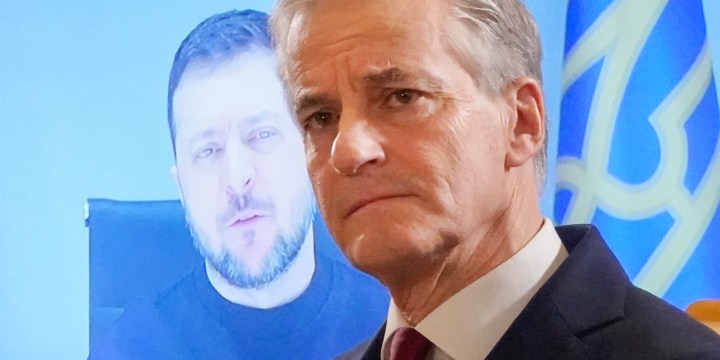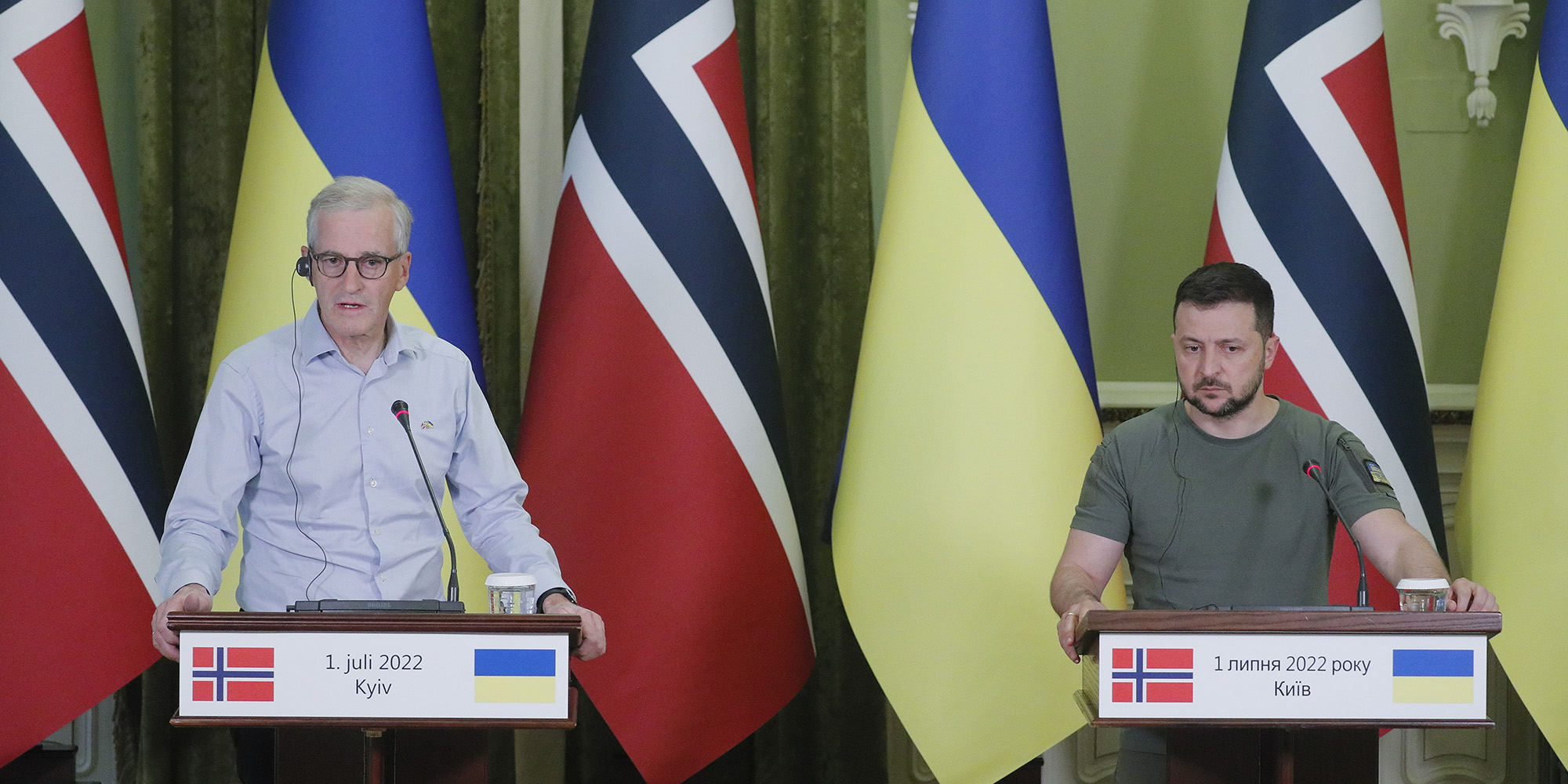WAR IN EUROPE OP-ED
As we remember Nazi invasion of our country, Norway stands firm in support of Ukraine and Nato

The outlook for positive political change in Russia is poor. Liberal forces have been marginalised; leading critics of the regime have been jailed or forced into exile; civil society and independent media have been silenced. The invasion of Ukraine has resulted in a much more autocratic Russia.
During these days of April in 1940, Nazi Germany invaded Norway. My mother – five years old at the time – still recalls German airplanes with swastikas bombing a military airfield outside Oslo.
Norway believed that neutrality would serve as a defence against invasion, and consequently was ill-prepared for the war. Nevertheless, with the help of allies, Norway fought against the invaders for two months before succumbing to their overwhelming might.
Five terrible years of German occupation followed. Norwegians lived under a dictatorship propped up by 400,000 German soldiers. All over Europe, war, violence and death were Hitler’s instruments to gain power and to grab territory.
UN Charter guards against ‘might is right’
Most nations in Europe thought that we had left behind the era of war and invasion against neighbouring countries after World War 2. The 50 million who died birthed the UN Charter. For decades, the number of inter-state conflicts in the world decreased.
We assumed that the era of large-scale war in Europe was over, but we were wrong. Russia’s full-scale invasion of Ukraine takes us back in time to a time when the state of play between countries was decided on the principle of “might is right”.
In other words, the strong can do as they wish, without consideration of morals, norms, or laws. The mighty can deprive independent countries of their self-determination and violate their sovereignty.
Russia’s invasion of Ukraine has displaced 15 million people.
I have met some of the victims of this aggression in Norway. Olga and Danyl, a Russian-speaking couple from Mariupol in Ukraine, about 60km from the Russian border, are just one example. With their two small children, they fled under dramatic circumstances at the beginning of the invasion as the Russian army destroyed their city.
The family sought refuge in Norway, living in my brother’s house for several weeks before settling in as refugees. They refused to live under a Russian dictatorship. Just like refugees who came to Norway from war zones in the Democratic Republic of Congo, Somalia and Syria, the refugees from Ukraine need our assistance.
The blame game
Similar to big, bellicose European powers in the past, Russia is also a master of blaming the war on others, in particular on Nato’s so-called expansion. Norway has been a member since 1949. Like all of the alliance’s members, we joined it voluntarily after a democratic process.
Nato is a defensive alliance, and not a threat to anyone. Today’s Russia, on the other hand, is an existential threat to its neighbours. It was Russia that invaded parts of Georgia in 2008 and Ukraine in 2014 and 2022. The rest of Europe does not accept Russia’s invasion, which is why Europe is united against Russia’s invasion.

Norwegian Prime Minister Jonas Gahr Støre (L) and Ukrainian President Volodymyr Zelensky attend their joint press conference in Kyiv, Ukraine, 1 July 2022. (Photo: EPA-EFE / Sergey Dolzhenko)
Sovereignty and self-determination the core of democracy
Norway was liberated by the allied forces in May 1945. The first thing my mother did was to find her Norwegian flag, which had been hidden for five years. The Germans had outlawed the Norwegian flag, a symbol of resistance.
Norway’s freedom was achieved in part because of the Soviet Union, which suffered significant losses in liberating northern parts of the country. Norway has not forgotten this, and to this day, war memorials for fallen Soviet soldiers remain to demonstrate our gratitude and respect for their sacrifice.
The Kremlin leadership believed that they could easily dominate Ukraine, but the Ukrainian people are fighting for their self-determination, democracy and right to exist – just as Norwegians did during World War 2.
Norway rejected the notion that “might is right” at home and abroad ever since we got our constitution in 1814. The constitution itself was an act of rebellion against the big European powers at the time, who wanted to “hand over” Norway from Denmark to Sweden after the Napoleonic wars.
We supported African liberation movements politically and financially from the 1960s, including in South Africa. Today, Norway supports the self-determination of Ukraine and provides political and military support, as well as humanitarian and development aid.
Ukraine’s right to defend itself
After the horrors of World War 2, the UN Charter was meant to stop wars between states. Russia’s invasion of Ukraine is a gross violation of the UN Charter, something the UN Secretary-General has made very clear.
Ukraine has the right to defend itself from invasion, under both international law and basic moral principles. Norway’s support to Ukraine is also in line with the UN Charter. Norway does not accept that we, who share a border with Russia, should live in the shadow of threats of invasion. All countries, whether Norway, Ukraine or South Africa, have a right to self-determination.
It’s a tragedy for Russians, too
Russia is our neighbour. Even during the Cold War, Norway engaged with the Soviet Union.
In recent years, the Arctic Council has been an arena for useful cooperation, but these days the cooperation is very limited since Russia has broken the fundamental European and global norms for peaceful coexistence between neighbouring states.
The outlook for positive political change in Russia is poor. Liberal forces have been marginalised. Leading critics of the regime have been jailed or forced into exile. Civil society and independent media have been silenced. School children are taken away from their parents if they create drawings about ending the war. The invasion of Ukraine has resulted in a much more autocratic Russia.
Looking forward
Today, Germany is one of our closest allies. Germany’s record of democracy and commitment to upholding international law after World War 2 is impeccable.
Hopefully, we will be able to partner with a different Russia in the future, a Russia that does not inflict death on its neighbours, a Russia that does not use rape as a military tactic, a Russia that does not bomb civilians every day. A Russia, with its impressive culture and remarkable history, that has discarded the old European imperial way of thinking, and upholds the rights of its own citizens. A Russia that uses dialogue, not guns to engage with its neighbours.
Then Russia can be a force for good, not a country shunned by the rest of Europe. South Africa’s transformation from international pariah to democracy in 1994 shows us that such a change is possible.
It demonstrates how neighbouring countries can flourish when democracy is sacrosanct and international law guides relations between states. DM
Gjermund Sæther is the Norwegian Ambassador to South Africa.






 Become an Insider
Become an Insider
It’s almost as though Russia is a petulant child who doesn’t want friends and only attracts other bullies and minions into its circle of friends. South Africa falls into the minion category.
Dear Ambassador very powerful words indeed please use your words to show the leaders of SA the light in their diabolical foreign policy.